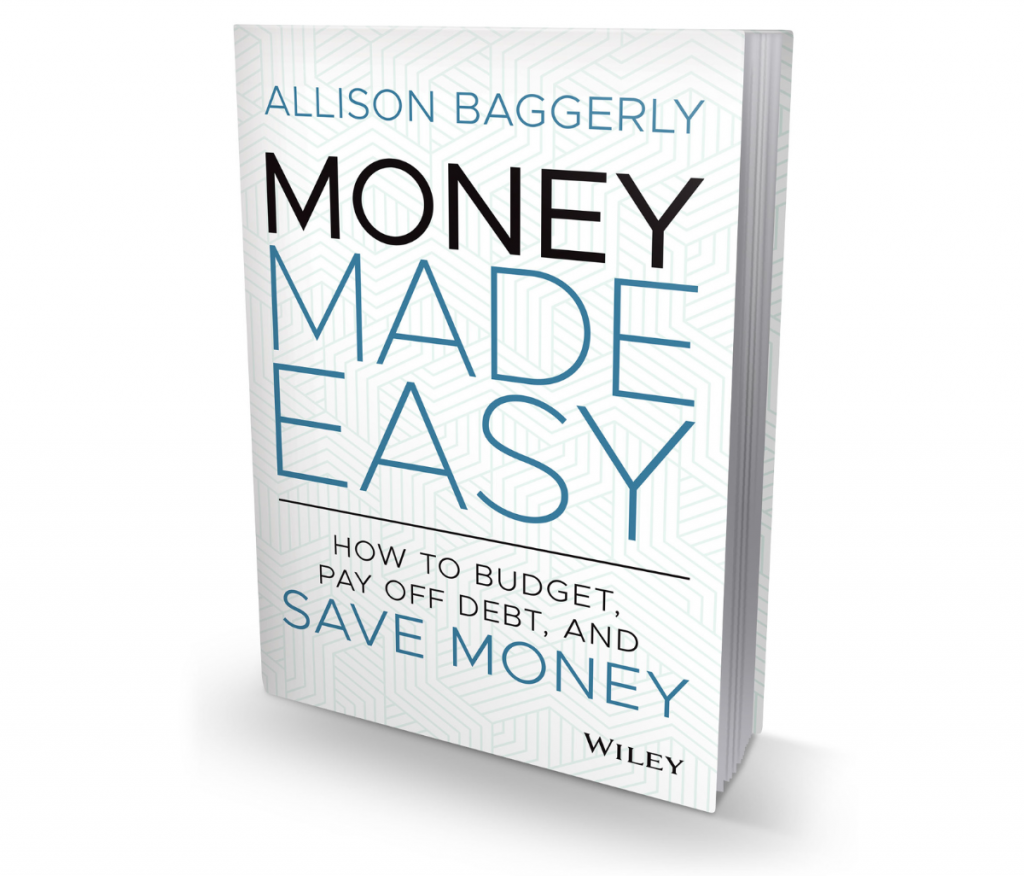In just over one week, my new book Money Made Easy will officially be out in the world! I’m currently feeling all the emotions: excited, nervous that no one will buy it, and relieved that this process feels like it’s over while simultaneously feeling like it’s just beginning.
The good news for you is that if you’re reading this before April 4, 2023, you still have time to pre-order your copy and claim your pre-order bonus: My Budget Review Vault.
The Budget Review Vault contains 21 in-depth budget review videos. They are similar to my incredibly popular Real People Budgets on social media, but 1,000 times better! This bonus gives you access to EVERY kind of budget you can imagine PLUS I share exactly how I would tackle each person’s finances.
This book & bonus combo is exactly what you have been needing.
With the book, you’ll have a plan for how to make managing your money easy. And with the budget review vault, you’ll see examples of how to approach a budget from beginning to end.
Here’s how to claim your free bonus:
- Buy Money Made Easy here, or wherever you buy books.
- Go here and fill out the form with your name and order number.
- Get instant access to the Budget Review Vault!
I have a feeling you’re going to love this extra bonus!

To celebrate my book hitting shelves in less than one month, we are going to talk about chapter 2 of my book: Money Habits and Money Mindset.
I’m a big believer that habits are imperative to your success no matter what you’re working toward. Maybe it’s because I struggle with ADHD and for years leaned on habits to help me complete the simplest of tasks. Or maybe it’s because habits are just freaking awesome.
I want to share one money habit that I have in my life that I believe is really easy to adopt.
As you may or may not know, I work from my home office each day. This means that my mornings are spent rushing around the house helping my kids get ready for school. I either drop them off in the car every morning or we ride our bikes up to school. Either way, I’m usually home right at 8:00 AM. In the past, I would jump into work right away because I knew I only had so many hours in a quiet house without the responsibilities of being a parent.
However, about a year ago I added in a new habit that I look forward to each day. When I get home to my empty house, I refill my cup of coffee and immediately sit down at my computer to update my expenses. I still track my expenses using Quicken (shoutout to Quicken because you’ve helped me understand my money so much better!). This usually takes me about 2 or 3 minutes, especially since I’ve typically tracked the morning before.
After that, I will log into my bank accounts to just check everything over. On Fridays I’ll pay off our credit card if any bills have been added to it. I never want to carry a balance on a credit card because the interest rates are just stupid insane.
Then, after I’ve spent about 5-7 minutes working on my money, I sit in my favorite pink chair in the corner of my office and journal. Sometimes I’ll only journal for 10 minutes, other times I’ll spend a good 20 minutes writing down any of my thoughts or feelings.
As any other small business owner out there might understand, there is always something on my list that needs to be worked on. I feel like I could work forever and never get to the bottom of my to-do list. In the past this led to a lot of stress, frustration, and overwhelm and I’m sure you can imagine.
That’s why I like to journal every morning before I start work. It helps me get in the right headspace to create balance in my life. You see, I can’t complete every task on my list. And that’s 100% okay. I just have to complete the most important tasks for the day.
This daily ritual, if you will, has completely transformed my work day and my money. It’s a habit that I truly hope sticks around for the long run.
And I want the same for you. I want you to create habits in your life that allow you to find balance between working on your money and enjoying your life. I want you to have habits in place that keep you from avoiding your financial truth and crossing your fingers that when you swipe your debit card it will run through without any errors.
So without further ado, let’s talk about 3 money habits you can add to your life so that you can reach your money goals. Feel free to adopt one, or all!
Money Habit #1: Face your financial truth
When my son Evan was younger (around 3 or 4 years old), he was terrified of going to bed alone. He wanted us to stay in his room until he fell asleep every night. That seemed like a reasonable request at first, but after a week it got old fast.
My husband, Matt, and I were left with a very upset toddler who was adamant that he couldn’t go to bed alone. It was not a fun experience for anyone involved.
I assumed he was just being difficult. However, my incredibly patient husband (and quite possibly the better parent here), knew that this fear of his stemmed from somewhere. By us simply staying in his room with him, he wasn’t facing his fear.
That’s when my husband laid down next to him in bed and asked him “Evan, what are you scared of?” To my surprise (but clearly not to Matt’s surprise) Evan started pointing at the shadows cast along the walls of his bedroom. These shadows were made from his nightlight and simple objects he had on his nightstand or dresser. Evan pointed at each shadow and said that it scared him. One shadow looked like a monster and the other looked like a dragon.
For every shadow that Evan pointed out in fear, Matt turned on the light and showed him that the shadow he was scared of was just an object in his room. He helped Evan face his truth. Evan’s truth? Objects can cast shadows. The monster was just a toy on his dresser and the dragon was a hat hanging on a hook.
By facing his truth, Evan was able to go to sleep soundly from that point on. Okay, okay – maybe not every night, but the difficulties we had before subsided.

Just like Evan had to face his own truth, you have to face yours. Except your truth might be even more terrifying than monsters: it could be high-interest credit card debt or an empty retirement account.
The goal is to stop avoiding your money and pretending like your debt or financial anxiety doesn’t exist. Your financial truth is wrapped up in the number and figures of your finances. The facts don’t lie and will highlight your money habits.
Here’s what I want you to do: get a piece of paper and face these four financial truths: your checking account balance, your savings account balance, your total debt, and your retirement savings.
Many people have several different checking accounts or savings accounts. If that’s you, be sure to include all of them. When it comes to totaling up your debt, you can either log into each debt account individually, or simply pull your credit report. By pulling your credit report, you’ll have all your debts listed in one place. This also allows you to see if you have any debts in collections. For your retirement savings, be sure to add up any money in an employee-sponsored account, like a 401(k), or an individual account like your IRA.
Now that you’ve done this, you’re ready to face your financial truth. Don’t let these numbers intimidate or scare you. Sure, your total debt might be higher than you imagined. And maybe you don’t have as much money set aside for retirement as you had hoped. The only way to move forward is knowing your starting point: your financial truth.
Look at these numbers and ask yourself how they make you feel. Are you proud of any area of your finances? Is there anything you’d like to change? Which of these numbers pulls on your emotions the most, in either a negative or positive way?
These numbers might even reveal money habits that you might not have recognized before. For instance, if you have high credit card payments, you might realize that you tend to rely on your credit card to cover any expenses when you’ve run out of money. This cycle of using credit cards keeps you in debt and using your credit card as a financial crutch.
By facing your financial truth, you know exactly where you stand with money. By knowing where you stand, you can make a plan for where you’re headed.
Money Habit #2: Identify patterns in your spending
When I was teaching elementary school, I started picking up a venti Starbucks coffee here and there. Sooner than I could even recognize, I had formed a pattern: every Friday I’d run by Starbucks to grab a coffee. It was my own personal trophy for making it through the week and keeping 24 nine-year-olds alive.

Now you’ll never hear me say that grabbing a weekly latte, or even a daily latte for that matter, is ruining your budget. I’m less of a “delete everything that brings you joy from your life so you can reach financial independence” type of person and more of a “spend money on what you value while also saving for your future” type of person.
And yet, it’s still important, no matter which camp you fall in, to identify patterns in your spending. When you’re willing to track your spending, you might be surprised that patterns in your spending are revealed to you. Just like I had to learn to expect my Friday celebration lattes, it’s important to identify your own patterns so that you can prepare or plan for certain expenses.
For instance, every December I tend to go overboard when it comes to spending money. I love spending money and because I’m buying a lot of gifts during this time, I can get a little carried away. I know that this is a pattern of mine. Instead of trying to stop it altogether or ignore it, I can embrace it by saving up a little extra spending money for myself during this time period. Or, I could buy any gifts earlier in the year so I’m not tempted come December.
By identifying patterns in your spending you set yourself up for the ability to make intentional decisions with your money. You give yourself the opportunity to be proactive with your spending instead of reactive when it comes to spending money.
Now it’s your turn. You can easily identify patterns in your spending by looking at your past spending behavior. Start by printing off your last bank statement. Get a highlighter and highlight every time you spent money on restaurants. Then, add that number up to see what you spent on eating out.
Grab a different color highlighter and highlight every time you spent money at the grocery store. It’s easy to overspend at the grocery store and justify the cost. Add up the transactions to see how much you spent on groceries over the month. The number might shock you!
Do the same for other areas of your spending such as clothing, entertainment, online shopping, and so on.
Then, find an area that you are determined to improve. Maybe you want to spend less on groceries, so you decide to start meal planning. Sometimes the simple act of finding patterns in our spending can motivate us enough to make a small change in the right direction.
Money Habit #3: Automate your future
One of the best money habits that you can implement is to automate your future and here’s why: automating your money allows you to put your finances and paying yourself first above everything else.
Hear me out…every month when my husband and I are paid, we have $350 automatically sent from our checking account to a separate savings account. This money is deposited into a savings account that will eventually help us cover expenses such as Christmas gifts, HOA dues, and flood insurance. By setting up this automation to happen right after we are paid, we are essentially paying ourselves first. We are prioritizing the expenses that we know are going to eventually come due.
The same can be done for investing! Currently, my husband automatically has money taken out of his check as a teacher and moved into his pension. And as a small business owner, I have money taken out of my paycheck and invested into a Solo 401(k).

By automating these types of tasks, we are paying ourselves first, prioritizing our future, and setting ourselves up for success. This has made investing and saving a no-brainer in our life. We don’t have to think twice about it because we already know it’s going to happen. The key is to set up these automations to happen directly after payday. That way you don’t have any time to spend the money that’s supposed to be saved or invested!
Now it’s your turn: think about how you can automate your future. Maybe it looks like setting up your bills to be paid on auto draft so that you never miss another due date. Another idea is to set up automatic savings from your paycheck to go to an HSA or FSA so you can cover any future medical bills. And of course, you can also automate your investing. By setting up automatic withdrawals from your paycheck into an employee sponsored retirement account such as a 401(k) or by automatically moving money from your checking account to an IRA – you’re making investing for your future a non-negotiable in your life.
This has been one way that we’ve made saving and investing for our future a no-brainer.
Money Habits: The Bottom Line
No matter where you stand with your money, there are ways for you to implement money habits in your life that help you focus on being intentional with your money. Like I said a little earlier: it’s all about being able to be proactive with your money rather than reactive. Money habits like these can ease your stress, set you up for success, and allow you to find peace of mind with your finances.

